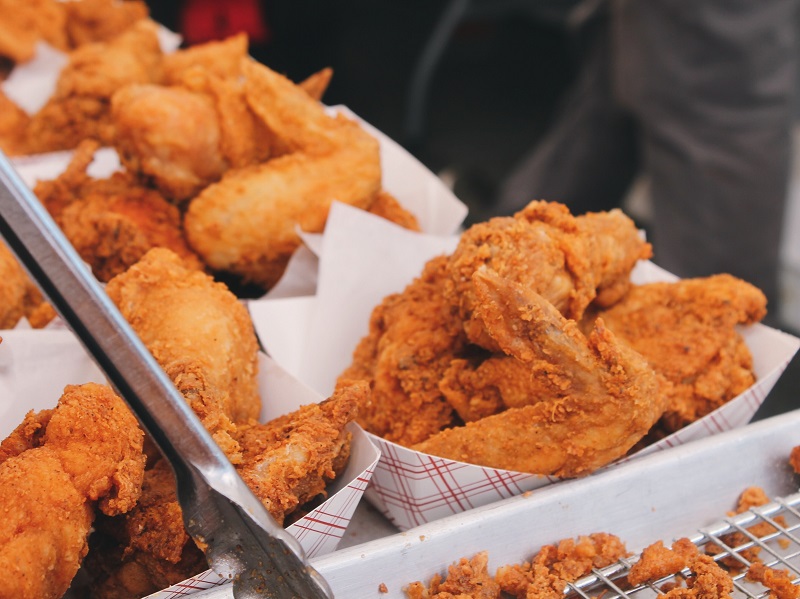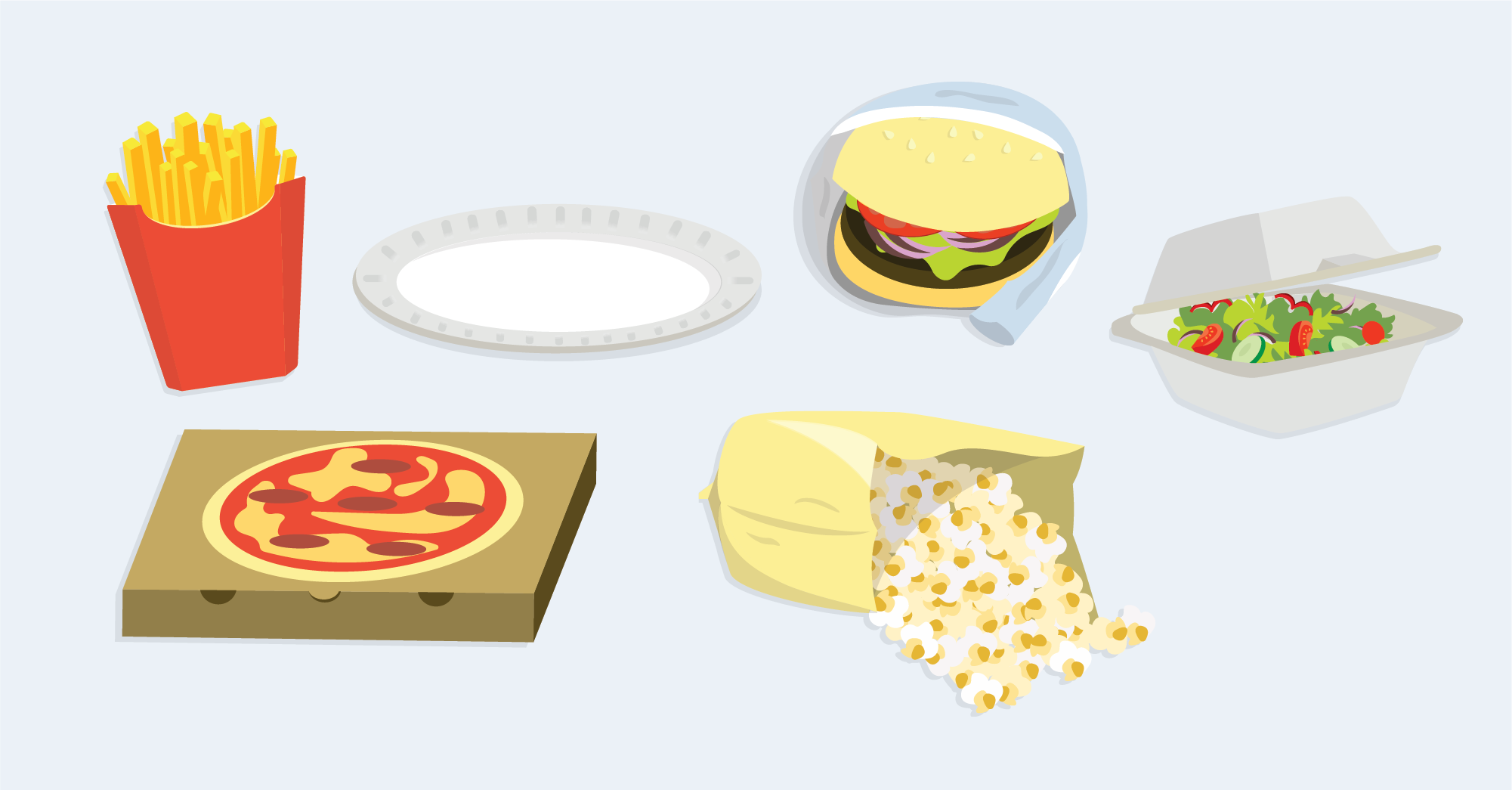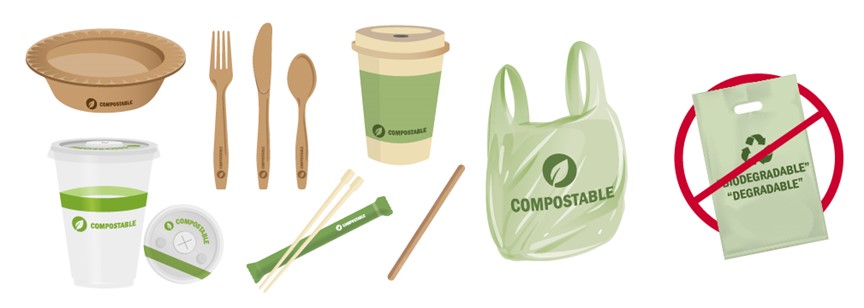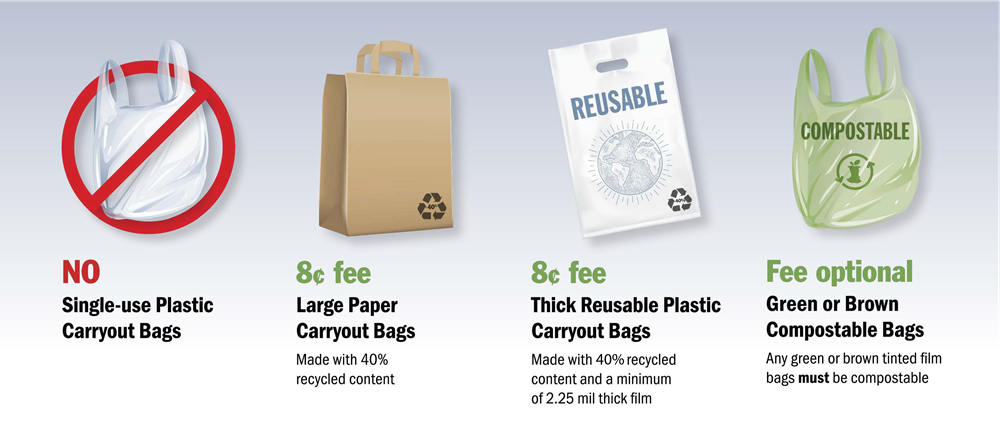
From coffee shops and cafeterias to restaurants and gas stations, food service often uses disposable products. While convenient, these products can create waste, add to pollution, and leach toxic chemicals into the environment. Washington has new requirements every food service establishment should know about.
Use PFAS-free food packaging
PFAS (per- and polyfluoroalkyl substances) are toxic chemicals sometimes used for greaseproof and waterproof coatings on food packaging. PFAS can cause health problems like higher cancer risk, weaker immune response, and lower birth weight.
People can be exposed to PFAS when eating food from packaging that contains PFAS. Food packaging can also release PFAS into soil and groundwater where it builds up in animals, people, and plants. That’s why Washington passed a law prohibiting the manufacture, sale, and distribution of certain food packaging containing PFAS.
Some packaging designed to hold freshly prepared food can contain PFAS, a group of toxic chemicals.
On Feb. 1, 2023, certain types of food packaging were banned if they have PFAS intentionally added. These include:
- Wraps.
- Plates.
- Food boats.
- Pizza boxes.
As of May 1, 2024, the following products are also banned if they have PFAS intentionally added:
- Bags and sleeves.
- Bowls.
- Flat serviceware, including items like plates and trays.
- Open-top containers, like french fry cartons and food cups.
- Closed containers, like clamshells.
Manufacturers of these products must certify their products comply with the law. If you’re purchasing these products, ask the manufacturer for their certificate of compliance. For more information, visit our PFAS in food packaging law webpage or email hwtrpubs@ecy.wa.gov.
Avoid expanded polystyrene
On June 1, 2024, several food service products made of expanded polystyrene will be banned for sale and distribution in Washington.
Expanded polystyrene (EPS), often mistakenly called Styrofoam™, is a type of foamed plastic used in takeout food containers and packing peanuts. While expanded polystyrene can be recycled, it is expensive and not accepted in most curbside recycling programs.
In Washington, foam fragments – including EPS – are two of the top ten items collected during beach cleanups conducted by Surfrider Foundation volunteers.
The sale and distribution of EPS packing peanuts, single-use coolers, and food service products is prohibited.
As of June 1, 2023, expanded polystyrene packing peanuts are prohibited for sale and distribution in Washington. And on June 1, 2024, expanded polystyrene food service products such as cups, plates, to-go clamshells, trays, food containers, and single-use coolers will be banned as well.
For more information and a list of alternative products, visit the expanded polystyrene ban webpage or email epsban@ecy.wa.gov. Be sure to purchase alternatives that are PFAS-free.
Look for compostable product labeling
Starting Jan. 1, 2024, Washington’s Plastic Product Degradability Law (RCW 70A.455) set standards for labeling an item as compostable. Changes to the law were passed in 2024 and go into effect June 6. Products made entirely of wood, or 98% other fiber (with no plastic additives), are exempt from the labeling standards.
Look for the third-party certification logo if you buy, sell, or distribute compostable products. All compostable products in Washington should be certified for composting in industrial settings and tested to meet a recognized scientific standard, like ASTM (American Society for Testing and Materials). In addition to a third-party certification logo, look for green, beige, and brown color schemes and the written word “compostable.” Be sure to check if your waste collection service accepts compostable products before putting them in your organics collection bin.
Look for compostable products with the right labeling features (green, beige, or brown color or striping, certifier logo, and the word “compostable”). Avoid “greenwashing” products, which mislead consumers about their environmental impacts.
Compostable products should meet the labeling standards as of Jan. 1, 2024. People can report violations starting July 2024. In addition to reporting products that don’t comply, people can report attempted greenwashing like non-compostable film bags that are tinted green and using words other than compostable like “biodegradable” and “degradable.” For more information, visit the compostable product labeling requirements webpage or email organics@ecy.wa.gov.
Stay tuned for more information about enforcement in 2024.
Avoid single-use plastic carryout bags
Single-use plastic bags are banned in Washington. Businesses may provide alternatives, like bags that are reusable, compostable, or made of paper. They can also offer customers used boxes or go bag-free. This ban went into effect Oct. 2021. For details about the law, printable flyers in 17 languages, and a list of acceptable alternatives, visit the plastic bag ban webpage or email bagban@ecy.wa.gov.
Washington's single-use plastic bag ban started in 2021. It reduces pollution by prohibiting single-use plastic carryout bags and charging a fee for acceptable bags.
Ask customers before giving out single-use serviceware
Single-use items covered by the law include plastic and compostable utensils, straws, condiment packages, and cup lids for cold beverages. Customers must verbally confirm they want these items, or they can select them from self-service bins. (Health care facilities are exempt.) For more information and downloadable flyers in 17 languages, visit single-use serviceware webpage or email SWMPublications@ecy.wa.gov.
As of 2022, businesses cannot automatically include single-use items in customer orders.
More information
Ecology’s Quick Guide for Food Service Organizations and Businesses provides a summary of these requirements and links to more information in multiple languages:
- Guía rápida sobre las leyes de reducción de residuos y sustancias tóxicas del estado de Washington (Spanish).
- Hướng dẫn Nhanh về Luật Giảm thiểu Chất thải và Chất độc của bang Washington (Vietnamese).
- 워싱턴주 폐기물 및 독성물질 감소법 (Korean).
- 华盛顿州废物和有毒物质减少法食品服务机构和经营业主快速指南 (Chinese).
- Washington ግዛትቆሻሻቆሻሻ እናእና መርዛማመርዛማ ነገሮችንነገሮችን የመቀነስየመቀነስ ህጎችህጎች (Amharic)
- (Arabic) للحد من النفايات والمواد السامة Washington قوانين ولاية
- Washington राज्य अपशिष्ट और विषाक्तता न्यूनीकरण कानून (Hindi)
- Negara Bagian Washington Undang-Undang Pengurangan Limbah dan Bahan Beracun (Indonesian)
- Washington 州廃棄物および有害物質の削減に関する法律 (Japanese)
- រដ្ឋ Washington ច្បាប់ស្ដីពីការកាត់បន្ថយការប្រើប្រាស់សារធាតុពុល និងកាកសំណល់ (Khmer)
- ລັັດ Washington ກົດໝາຍວ່າດ້ວຍການຫຼຸດຜ່ອນສິ່ງເສດເຫຼືອ ແລະສານພິດຂອງ (Lao)
- Naannoo Washington Seerawwan Hir'isii Kosii fi Balfaawwanii (Oromo)
- Штат Washington Законы о сокращении количества отходов и токсичных веществ (Russian)
- Gobalka Washington Sharciyada Dhimista Qashinka iyo Waxyaabaha Sunta ah (Somali)
- Estado ng Washington Mga Batas sa Pagbabawas ng Basura at Mga Nakalalason (Tagalog)
- รััฐ Washington กฎหมายว่่าด้้ว่ยการลด้ของเสีียและสีารพิิษ (Thai)
- Washington State ሕግታት ምጉዳል ጎሓፍን መርዛማትን ነገራትሕግታት ነገራት (Tigrinya)
- Штат Washington Закони щодо зменшення кількості відходів і токсичних речовин (Ukrainian)






